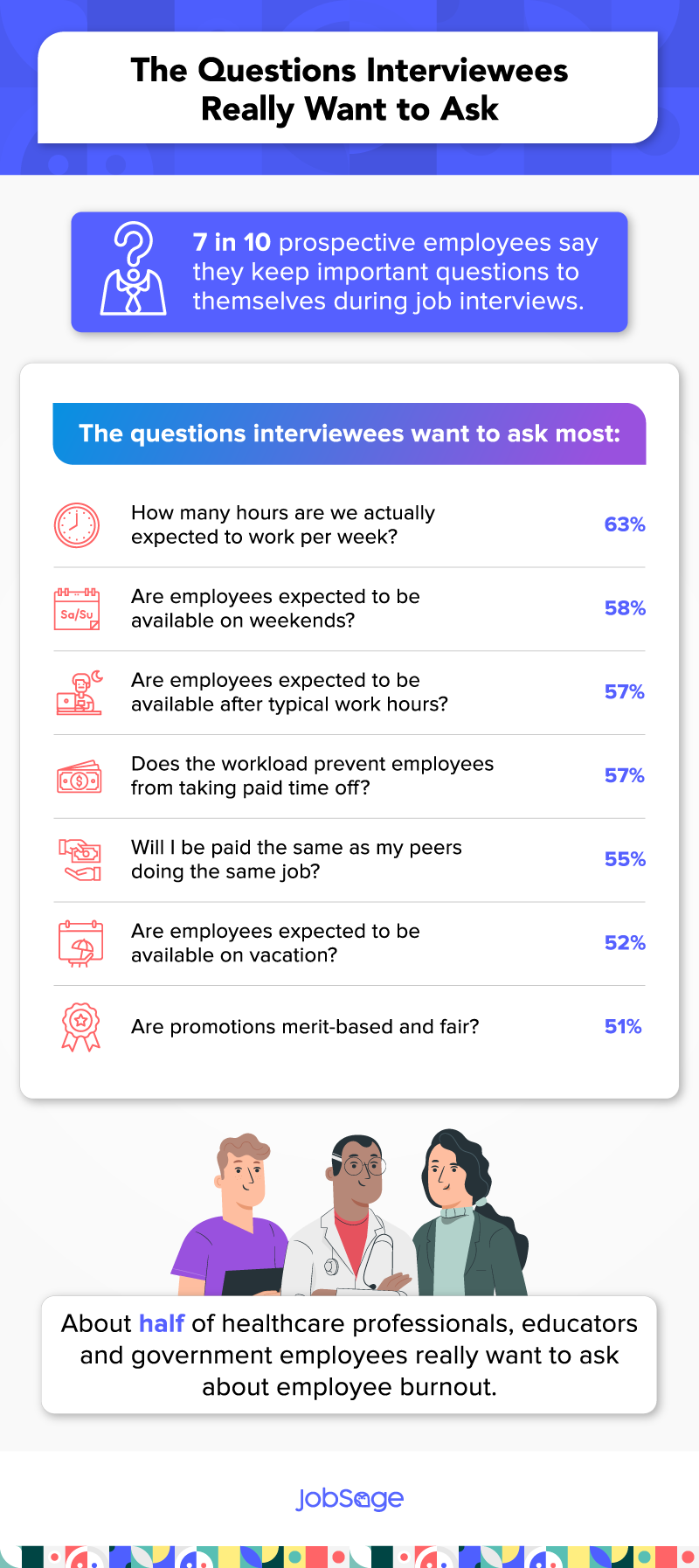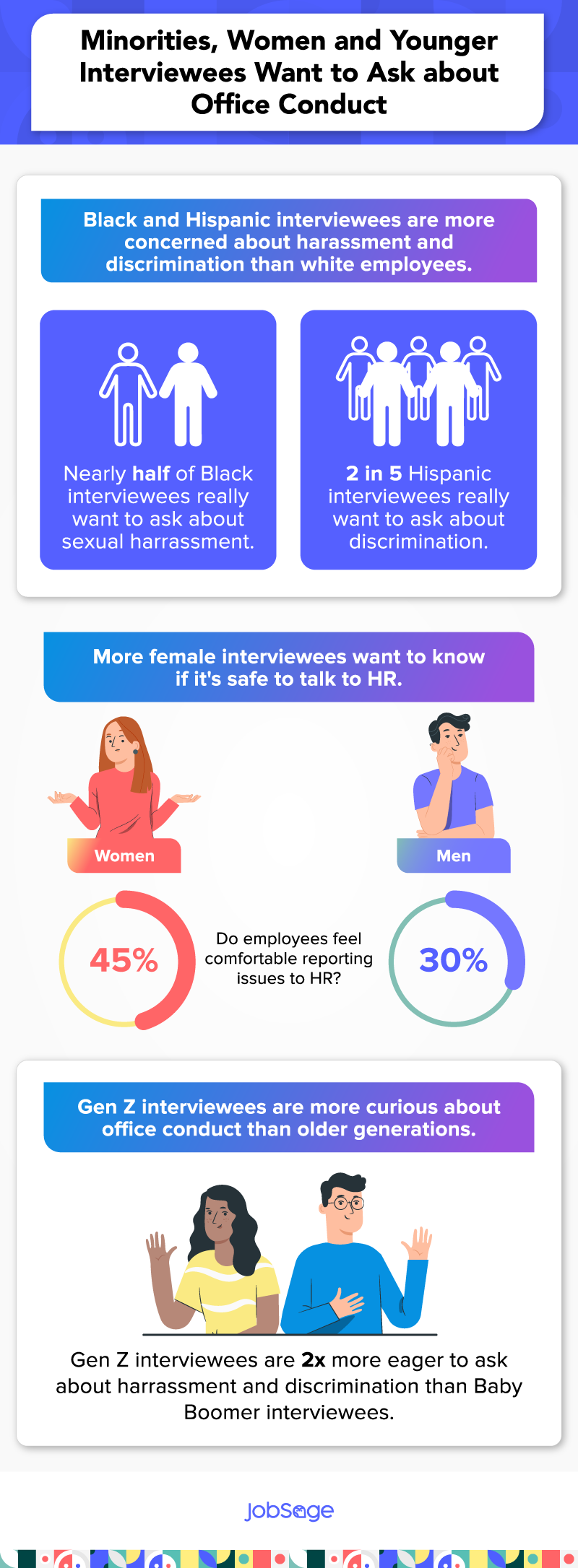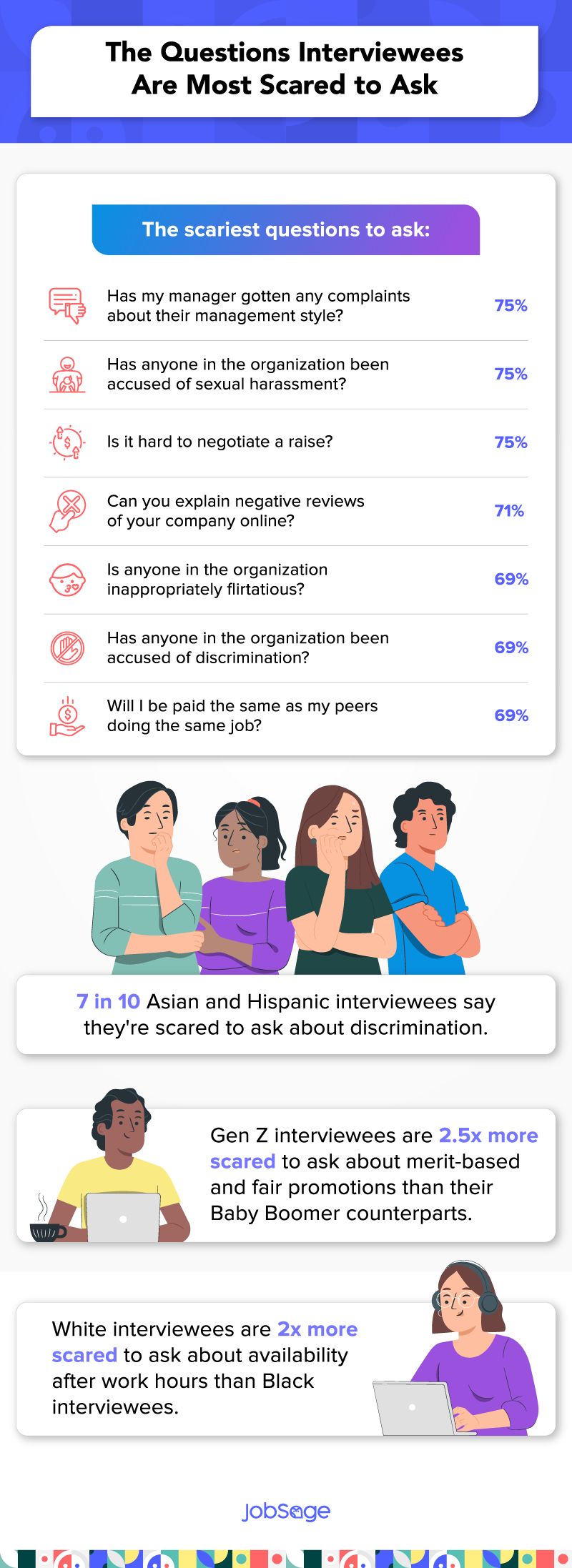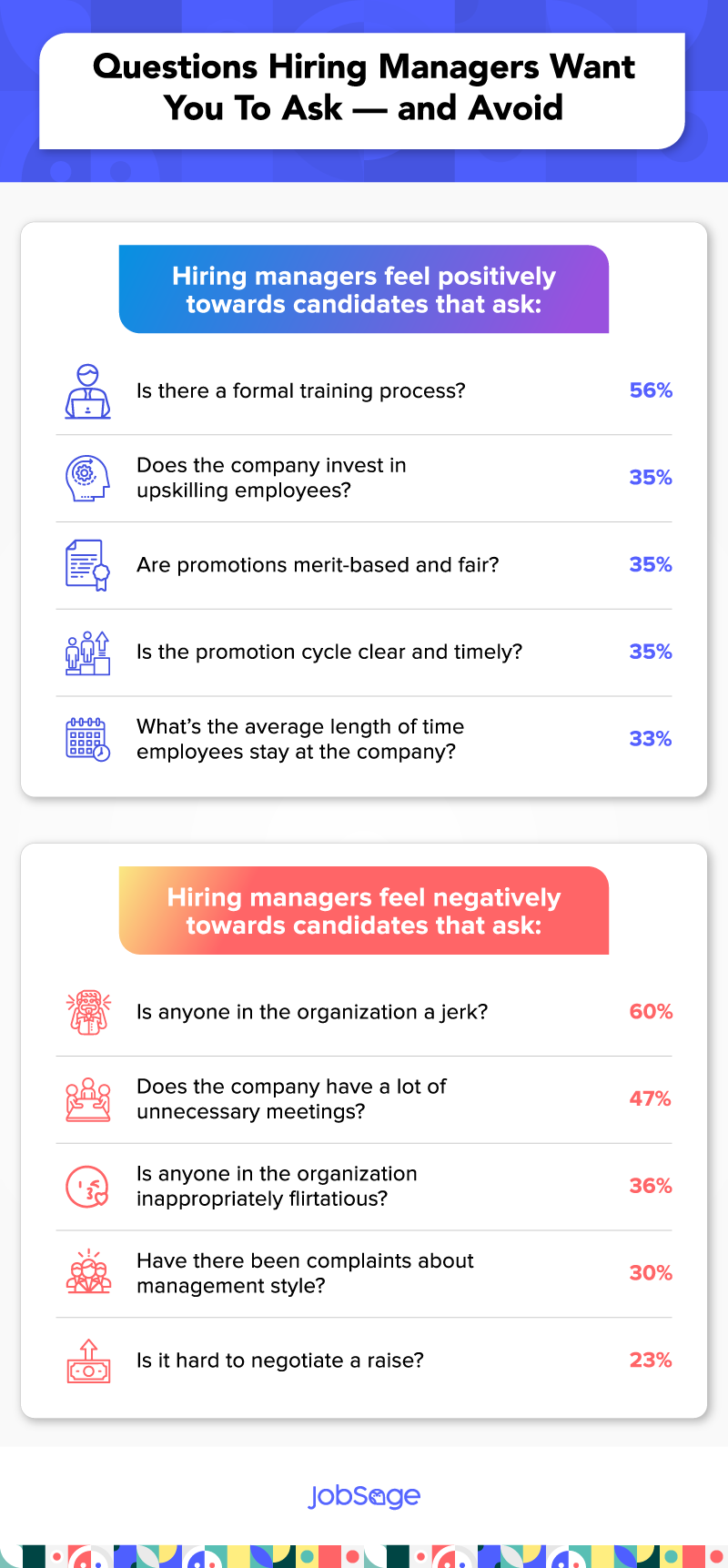We know it can be scary to voice your opinions to prospective employers — even current employees can find it hard to be completely authentic at work. Job interviews provide opportunities for candidates and companies to get to know each other, but it’s commonly accepted that some things are better left unsaid. Some questions are considered rude, others presumptuous, but which really hurt your chances of getting hired — and which might actually help?
To get some answers, we surveyed 700 full-time employees and 300 hiring managers in the United States. From workload to training opportunities, we asked about a variety of different interview topics to understand what interviewees really want to talk about, what they’re scared to ask and what hiring managers want to hear.
Key findings
- 7 in 10 prospective employees keep important questions to themselves during job interviews.
- The number-one thing job seekers wish they could ask during interviews: “How many hours are we actually expected to work per week?”
- Hiring managers want candidates to ask about compensation and promotions, not office conduct.
Most candidates don’t ask everything during interviews
The job interview process is supposed to provide both employers and candidates with an opportunity to assess qualifications and fit, but candidates don’t always feel empowered to ask their most pressing questions. 7 in 10 prospective employees say they have questions they don’t ask during job interviews because they feel uncomfortable bringing up certain topics.
Asian interviewees are more likely than other minorities and their white colleagues to keep questions to themselves — nearly 4 in 5 (78%) said they don’t ask all their questions. Younger job-seekers are also more reluctant to ask everything on their minds: We found that Gen Z candidates were 18% more likely than older generations to keep certain questions to themselves.
Workload and compensation are top concerns for prospective employees
Nearly half (47%) of prospective employees said they’ve overlooked red flags during the hiring process before. The three most common red flags employees ignore are:
- High employee turnover
- Low compensation
- Poor work-life balance
Considering these red flags, you may not be surprised that interviewees are most eager to ask about workload, expected availability, and compensation.
Nearly 2 in 3 (63%) prospective employees really want to ask how many hours they’re expected to work per week, and more than half want to ask if they need to be available on weekends (58%) or after typical work hours (57%).
Prospective employees also wonder about the balance between work and rest: over half want to ask if their workload would prevent them from taking paid time off (57%) and if they’d need to be available on vacation (52%).

No one wants to get paid less than a teammate doing the same exact job or keep working for the same salary when their performance deserves a raise. 55% of prospective employees really want to ask whether or not they’ll be paid the same as their peers, and 51% really want to ask if promotions are truly merit-based and fair.
Pay equity is a bigger concern for Asian employees, who are more curious about compensation and promotions than their Black colleagues. 59% of Asian prospective employees really want to know if promotions are merit-based and fair, versus 49% of Black candidates. 48% of Asian candidates really want to know if it’s hard to negotiate a raise, versus 28% of Hispanic candidates.
Those who work closely with other people and team members, like creative professionals, educators and hospitality workers — tend to be especially concerned about equity too. They’re more likely than employees in other industries to really want to know if they’ll get equal pay for equal work.
Burnout is another pressing issue in certain industries. Government employees, healthcare professionals, and educators in particular want to ask their prospective employers if burnout is common in their workplaces.
Office conduct matters most to minorities, women and younger workers
While workload and pay are priorities for most workers, diversity and inclusivity are also increasingly important features of the workplace. We found minorities, women and younger candidates are particularly curious to learn about office conduct when they’re interviewing for new roles.
Black and Hispanic employees are more concerned about inappropriate flirtation, sexual harassment and discrimination than white workers are. Nearly half (49%) of Black employees say they really want to ask about sexual harassment, and 2 in 5 Hispanic employees say they really want to know if anyone in the organization has been accused of discrimination.

Female professionals are twice as likely to wonder about these kinds of office conduct issues as their male colleagues — and they want to know what power they’ll have to address any issues that do arise. 45% of female workers say they really want to ask if employees at the company are comfortable reporting issues to human resources, compared to 30% of male workers.
Gen Z employees are also more curious about office conduct than older generations. They’re two to three times more likely to wonder about these office conduct issues than their Baby Boomer counterparts.
Interviewees are scared to ask about social dynamics in the office
Asking questions about social dynamics and compensation is particularly daunting for interviewees, even if they really want to know the answers.
- 3 in 4 workers say they’re scared to ask if there have been any complaints about their prospective manager’s leadership style.
- 3 in 4 are scared to ask if anyone in the organization has been accused of sexual harassment — and nearly 7 in 10 are scared to bring up inappropriate flirtation and other forms of discrimination.
- 3 in 4 are scared to ask about negotiating raises and 7 in 10 are scared to ask about equal pay.
Black candidates feel more emboldened to ask about discrimination accusations than other races — about 7 in 10 Asian, Hispanic and White employees say they’re scared to ask about it, compared to about half (51%) of Black employees.

When it comes to boundaries between personal and professional life, white and younger interviewees tend to fret more. White candidates are twice as likely as Black candidates to be scared to ask about availability after work hours, and Gen Z candidates are two times more scared to ask about how many hours they’re expected to work per week and expected availability outside of normal work hours than their Baby Boomer counterparts.
Younger prospective employees are also more scared to ask about promotions than veteran workers. Gen Z candidates are nearly twice as scared to ask about merit-based and fair promotions as Baby Boomers.
Again, we found that Asian employees are more hesitant than other minorities: Nearly 3 in 4 Asian employees are scared to ask about employee burnout, compared to just half (51%) of Black employees.
Hiring managers say it’s best to skip office politics, ask about compensation and promotions
Hiring managers agree it’s best to avoid questions about office conduct during interviews, but welcome questions that allow them to showcase how their companies invest in employees for the long haul. Though bringing up some of these topics may be nerve-wracking, asking about training and promotions could help interviewees’ chances of landing new jobs.
Across industries, hiring managers said they would feel more positively toward a candidate that asked about the training process (56%), upskilling (35%), promotions (35%) and typical employee tenure (33%).
Questions about burnout and availability outside of work hours are especially valued in service industries like hospitality and healthcare. 43% of the hiring managers working in the hospitality industry said they’d feel more positively towards candidates who asked about employee burnout. A third of the hiring managers working in government said they’d feel more positively towards candidates who ask about hours worked per week.

But during interviews, hiring managers don’t want to hear questions about office conduct or management — they find these kinds of questions uncomfortable and even presumptuous. They said they would feel more negatively towards candidates who asked about jerks in the organization (60%), unnecessary meetings (47%), inappropriate flirtation (36%), management style (30%) and negotiating raises (23%).
While asking about office jerks and meetings can be presumptuous, some of these other questions get to the heart of company culture. Companies should take note that minority candidates are more likely to want to ask questions about office conduct than white interviewees. Employers seeking to build diverse teams need to be mindful not to penalize candidates for asking some of the more uncomfortable questions.
If the interview process has left you with unanswered questions about a potential employer, JobSage has thousands of reviews written by employees that offer insights on inclusion, growth opportunities, compensation and more.
Methodology
From May 18 to 19, 2022, we surveyed 700 Americans who were employed full-time. 54% identified as male, 44% identified as female, and 2% identified as non-binary. 7% were Baby Boomers, 25% Gen X, 58% Millennials, and 10% Gen Z. The racial breakdown was 77% White, 9% Asian, 6% Black, 5% Latinx/Hispanic, and 3% Other.
We also surveyed 300 hiring managers. 49% identified as male, 50% female, and 1% non-binary. 15% were Baby Boomers, 29% Gen X, 6% Gen Z, and 50% Millennials. The racial breakdown was 77% White, 8% Asian, 4% Black, 7% Latinx/Hispanic, and 3% Other.
